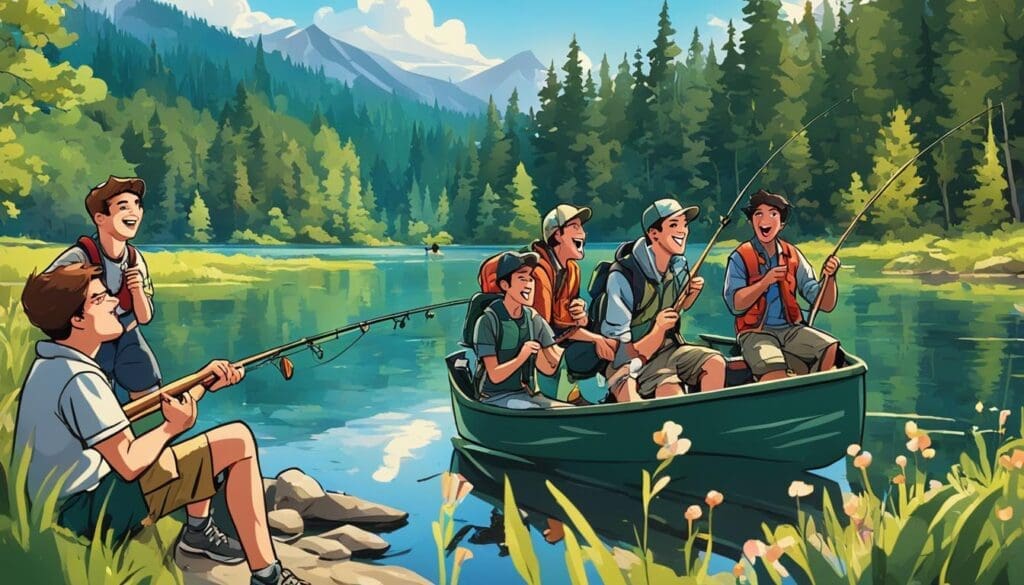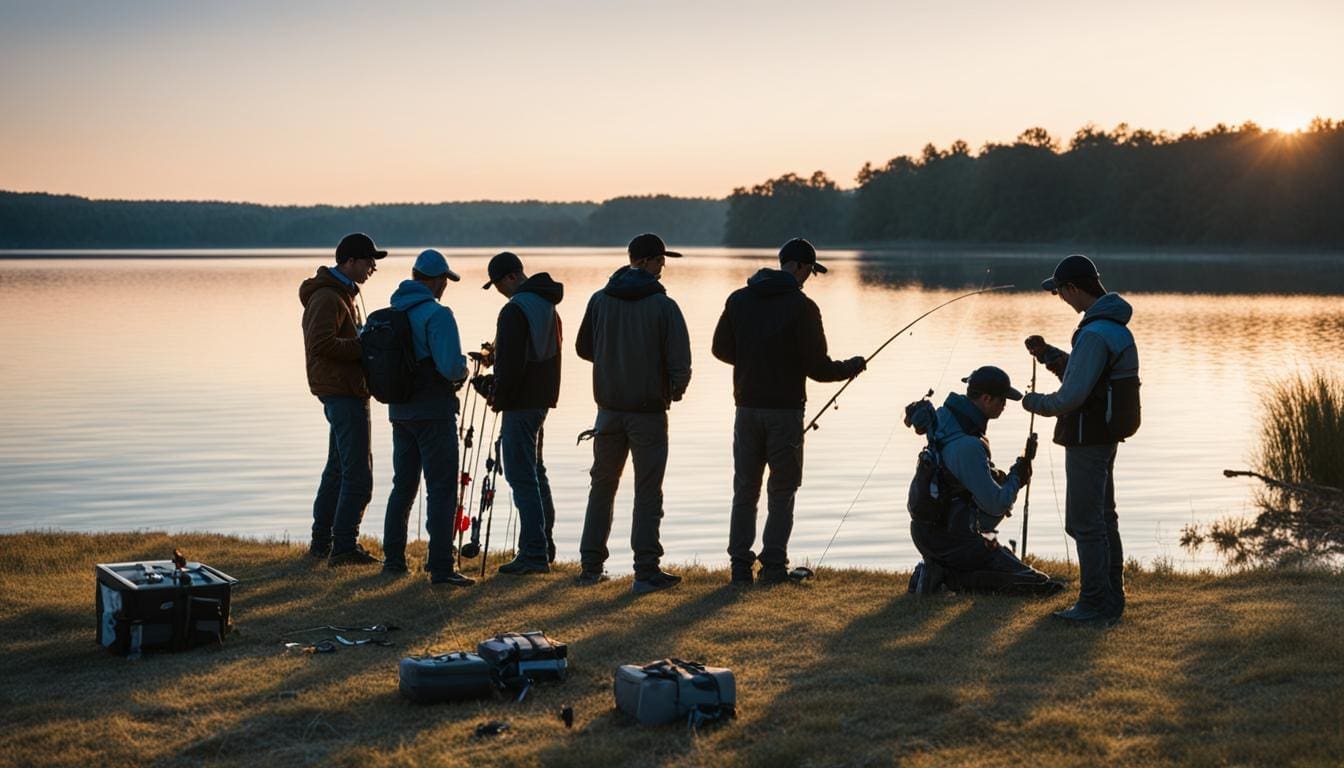Youth fishing competitions have gained immense popularity in recent years, providing a platform for the next generation of fishing champions to showcase their skills and passion. Whether it’s high school angling teams or college bass fishing tournaments, these competitions offer young anglers the opportunity to compete against their peers and excel in the sport they love.
With the rise of student fishing leagues and the availability of fishing scholarships, young anglers can now pursue their passion for fishing while receiving a quality education. These competitions not only foster skill development but also provide valuable mentorship, conservation education, and the chance to represent their schools or colleges on a competitive stage.
Key Takeaways:
- Youth fishing competitions are growing in popularity, nurturing the next generation of fishing champions.
- High school angling teams and college bass fishing tournaments provide opportunities for young anglers to showcase their skills.
- Student fishing leagues and scholarships enable young anglers to pursue their passion for fishing while getting a quality education.
- Mentorship and conservation education are integral parts of youth fishing competitions, ensuring responsible angling practices.
- Participating in fishing competitions helps young anglers develop important life skills like teamwork, perseverance, and sportsmanship.
The Growth of Youth Fishing Competitions
Youth fishing competitions have experienced significant growth in recent years. These competitions provide young anglers with a platform to showcase their skills and compete at various levels, from local high school fishing tournaments to national college fishing events. Organizations like Major League Fishing (MLF) and B.A.S.S. have established tournament circuits specifically for teens, offering them the opportunity to compete against their peers and gain valuable experience in a competitive environment.
One of the key factors contributing to the growth of youth fishing competitions is the establishment of clear and standardized competition rules. These rules ensure fair play and the safety of participants. Whether it’s a high school fishing tournament or a college fishing event, each competition has its own set of rules and regulations that all anglers must adhere to. This not only creates a level playing field for all participants but also instills a sense of discipline and sportsmanship among young anglers.
In addition to organized tournaments, there are also local fishing clubs and associations that provide opportunities for young anglers to compete and improve their skills. These clubs often host regular fishing events and provide mentorship programs, allowing experienced anglers to guide and support the next generation of anglers. This sense of community and support is an important aspect of youth fishing competitions, fostering a love for the sport and creating lifelong friendships among young anglers.
Table:
| Competition | Target Age Group | Level |
|---|---|---|
| Abu Garcia College Fishing | College students | National |
| Bassmaster High School National Championship | High school students | National |
| Major League Fishing (MLF) Junior | Teens | National |
| Local High School Fishing Tournaments | High school students | Local/Regional |
| College Fishing League | College students | Regional/National |
The Benefits of Youth Fishing Competitions
Youth fishing competitions offer a range of benefits to young anglers. Many high schools and colleges now have fishing teams and dedicated coaches who provide guidance and support to aspiring anglers. These coaches not only teach fishing techniques but also focus on the development of important life skills such as teamwork, perseverance, and sportsmanship. The mentorship provided by fishing team coaching helps young anglers grow both on and off the water.
Furthermore, youth fishing competitions serve as a pathway for aspiring anglers to pursue fishing as a college sport. Many colleges and universities now offer fishing scholarships, allowing talented young anglers to continue their education while participating in competitive fishing. These scholarships not only provide financial assistance but also offer opportunities for fishing team sponsorship, giving student anglers access to quality gear and equipment.
| Benefits of Youth Fishing Competitions | Description |
|---|---|
| Youth Angler Development | Coaches provide guidance and support for aspiring anglers, helping them develop fishing skills and important life lessons. |
| Fishing as a College Sport | Young anglers can pursue their passion for fishing while continuing their education by participating in college fishing programs and earning scholarships. |
| Fishing Team Sponsorship | Student anglers have the opportunity to secure sponsorships, receiving sponsored gear and equipment to compete at a high level. |
The Importance of Fishing Team Coaching
Fishing team coaching plays a vital role in the development of young anglers. Coaches not only teach fishing techniques and strategies but also instill discipline and a strong work ethic in their team members. They provide guidance on scouting locations, reading weather patterns, and analyzing fishing conditions, helping young anglers make informed decisions on the water. The mentorship aspect of fishing team coaching goes beyond fishing skills, also focusing on leadership development and character building.
The Importance of Conservation Education in Youth Fishing Competitions
One of the key aspects of youth fishing competitions is the emphasis on conservation education. These competitions go beyond simply promoting angling skills and instill in young anglers a sense of responsibility and stewardship towards the environment.
Many organizations and competition organizers actively incorporate conservation education into their events. Workshops and seminars are organized to educate young anglers about topics such as fish habitat protection, catch and release practices, and the importance of maintaining a balanced ecosystem. By imparting this knowledge, youth fishing competitions ensure that future generations of anglers are well-equipped to engage in sustainable fishing practices.
To further strengthen the impact of conservation education, mentorship programs are established within these competitions. Experienced anglers are paired with young competitors, providing valuable guidance and mentorship. This mentorship not only focuses on improving angling skills but also promotes a deep appreciation for the environment and the vital role that conservation plays in preserving the future of fishing.
| Benefits of Conservation Education in Youth Fishing Competitions |
|---|
| 1. Promotes environmental stewardship and responsibility |
| 2. Develops an understanding of the importance of sustainable fishing practices |
| 3. Fosters a sense of appreciation for the natural beauty of fish habitats |
| 4. Creates a generation of anglers who actively contribute to the preservation of the sport |
By integrating conservation education into youth fishing competitions, organizers are playing a crucial role in ensuring the long-term sustainability of the sport. Young anglers are not only gaining valuable fishing skills but are also becoming ambassadors for the environment, spreading awareness and actively contributing to the conservation efforts that are essential for the future of fishing.
Youth Fishing Competitions and Safety
Safety is a top priority in youth fishing competitions. Organizers and officials take necessary precautions to ensure the safety of participants. This includes enforcing boating safety regulations, providing life jackets, and conducting regular safety briefings. The goal is to create a safe and enjoyable environment for young anglers to compete.
One crucial aspect of safety in fishing tournaments is the enforcement of boating safety regulations. Participants are required to adhere to strict rules regarding boat speed, navigation, and proper use of safety equipment. This helps minimize the risk of accidents and ensures the well-being of all competitors.
In addition to boating safety, the provision of life jackets is essential in youth fishing competitions. Organizers ensure that every participant has access to properly fitted life jackets and emphasize their importance in preventing accidents and saving lives. Safety briefings are also conducted before each competition to remind anglers of best practices and emergency procedures.
“Safety is of utmost importance in youth fishing competitions. We want these young anglers to have a positive and safe experience while pursuing their passion for fishing. By enforcing boating safety regulations, providing life jackets, and conducting safety briefings, we aim to create a secure environment for them to showcase their skills and enjoy the competition.” – Tournament Official
Fishing tournaments, especially those for youth, have also implemented measures to address the recent COVID-19 pandemic. This includes designated weigh-in locations and procedures to minimize crowding and maintain social distancing. These precautions help ensure the safety and well-being of all participants and mitigate the risk of viral transmission.
Overall, youth fishing competitions prioritize safety through the enforcement of boating regulations, provision of life jackets, and adherence to safety protocols. These measures not only protect the young anglers but also contribute to the overall success and enjoyment of the competitions.
| Safety Measures in Youth Fishing Competitions |
|---|
| Enforcement of boating safety regulations |
| Provision of properly fitted life jackets |
| Conducting safety briefings |
| Designated weigh-in locations and procedures for social distancing |
Strategies for Success in Youth Fishing Competitions
Youth anglers participating in fishing competitions employ various strategies to increase their chances of success. The key to success lies in understanding the fish’s behavior and adapting techniques accordingly. Here are some effective strategies that young anglers can use to excel in youth fishing competitions:
- Research and Preparation: Before heading to a competition, thoroughly research the body of water you’ll be fishing in. Study maps, local reports, and previous tournament results to identify potential hotspots and patterns. This research will help you develop a game plan and narrow down your fishing areas.
- Experiment with Baits and Techniques: Fishing conditions can change rapidly, so it’s crucial to be versatile. Carry a variety of baits and experiment with different techniques such as flipping, pitching, or topwater fishing. Don’t be afraid to try something new if your initial approach isn’t yielding results.
- Focus on Presentation: Pay attention to your bait’s presentation. Look for subtle details like the speed and angle of the retrieve, the type of line used, and the size and color of the bait. Making small adjustments to your presentation can often make a big difference in enticing bites.
“Fishing is a mental game as much as it is a physical one. Stay focused, trust your instincts, and adapt to changing conditions. Remember, even the smallest adjustment can turn a slow day into a successful one.” – Professional Angler
Table: Common Strategies for Youth Fishing Competitions
| Strategy | Description |
|---|---|
| Pattern Fishing | Identify and replicate specific patterns in fish behavior, such as feeding times, preferred cover, or depth. |
| Location Selection | Focus on high percentage areas like points, drop-offs, weed beds, or areas with structure and cover. |
| Consistent Decision Making | Stay committed to your chosen strategies and locations, even when faced with initial setbacks. |
| Adapting to Conditions | Adjust techniques and bait selection based on factors like water temperature, clarity, and weather conditions. |
| Time Management | Efficiently allocate your fishing time, focusing on high potential areas during peak feeding windows. |
| Consistent Practice | Hone your skills through regular practice sessions, including casting accuracy, lure presentation, and fish handling. |
By implementing these strategies and continuously refining their skills, young anglers can improve their performance and increase their chances of success in youth fishing competitions.

Fishing Club Benefits:
- Opportunities for skill development and growth
- A supportive community of like-minded individuals
- Involvement in internal tournaments and fishing outings
- Access to experienced anglers and mentors
- Participation in local and regional fishing competitions
- Development of important life skills
College Fishing Scholarships and Opportunities
For young anglers passionate about fishing, the opportunity to earn a college scholarship while pursuing their favorite sport is an enticing prospect. College fishing scholarships are becoming increasingly popular, offering talented student anglers the chance to fund their education while honing their skills on the water. These scholarships are awarded based on a combination of fishing abilities, academic achievements, and leadership qualities, providing a well-rounded opportunity for aspiring anglers.
Collegiate fishing programs not only offer valuable financial support but also provide sponsored gear and equipment to student anglers. This allows them to compete at a high level while proudly representing their respective colleges. From high-quality fishing rods and reels to specialized fishing apparel, the sponsored gear not only enhances the angler’s performance but also serves as a symbol of their affiliation with the college fishing community.
With college fishing scholarships and sponsored gear, young anglers have the opportunity to excel in both their academic and fishing pursuits. These opportunities not only encourage the growth of the sport but also nurture the next generation of fishing champions. As young anglers continue to showcase their skills and passion for fishing, it is likely that college fishing scholarships and opportunities will continue to expand, providing more aspiring anglers the chance to chase their dreams while furthering their education.
Conclusion
Youth fishing competitions, such as high school angling teams and college bass fishing tournaments, are shaping the future of fishing champions. These competitions provide young anglers with valuable opportunities for skill development, mentorship, and conservation education.
With the support of fishing team sponsorship and coaching, aspiring anglers can pursue their passion for fishing while furthering their education. These competitions not only foster the growth of fishing skills but also instill qualities like teamwork, perseverance, and sportsmanship.
The rise of student fishing clubs and the availability of fishing scholarships make it possible for more young anglers to participate in competitive fishing and achieve their dreams. By nurturing the next generation of anglers, youth fishing competitions are ensuring the future sustainability of the sport.
FAQ
Are there age restrictions for youth fishing competitions?
Yes, youth fishing competitions typically have age restrictions that vary depending on the organization and tournament. Some competitions are open to high school students only, while others include both high school and college anglers.
How can young anglers participate in fishing competitions?
Young anglers can participate in fishing competitions by joining their high school or college fishing team, or by participating in local and regional fishing tournaments. They can also explore opportunities offered by student fishing leagues and organizations.
Do youth fishing competitions offer scholarships?
Yes, many colleges offer fishing scholarships to talented student anglers. These scholarships are typically awarded based on a combination of fishing skills, academic achievements, and leadership qualities.
What types of skills do youth fishing competitions promote?
Youth fishing competitions promote angling skills such as casting, bait selection, and fish handling. They also encourage the development of important life skills such as teamwork, perseverance, and sportsmanship.
How do fishing competitions ensure the safety of participants?
Fishing competitions prioritize safety by enforcing boating safety regulations, providing life jackets, and conducting regular safety briefings. They also have designated weigh-in locations and procedures to minimize crowding and maintain social distancing.
Are there mentorship programs available for young anglers?
Yes, many youth fishing competitions have mentorship programs that pair experienced anglers with young competitors. These programs aim to instill a sense of responsibility and appreciation for the environment, while providing guidance and support to aspiring anglers.
How can young anglers increase their chances of success in fishing competitions?
Young anglers can increase their chances of success by constantly refining their fishing skills, staying updated with the latest techniques and trends, and adapting their strategies based on factors like water conditions, bait presence, and fishing pressure.
Are there fishing clubs for students?
Yes, many high schools and colleges have established student fishing clubs. These clubs provide opportunities for young anglers to connect with like-minded peers, learn from experienced anglers, and participate in internal tournaments and fishing outings.
Can young anglers receive sponsored gear and equipment?
Yes, collegiate fishing programs often provide sponsored gear and equipment to student anglers. This allows them to compete at a high level while representing their respective colleges.
How do youth fishing competitions contribute to the future sustainability of fishing?
Youth fishing competitions contribute to the future sustainability of fishing by emphasizing the importance of conservation education. They organize workshops and seminars on topics like fish habitat protection, catch and release practices, and environmental stewardship, ensuring that future generations of anglers are well-educated in sustainable fishing practices.

